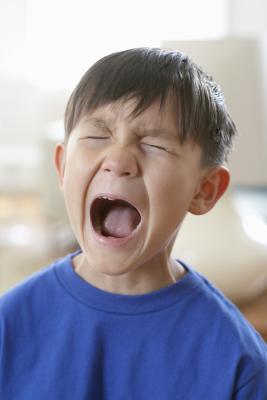If your child’s generally positive demeanor occasionally comes with rages or periods of extreme sorrow, you may feel at your wit’s end. Children who have fits or tantrums with regularity often lack the control necessary to deal with their emotions properly and, as a result, act out in extreme sadness or anger. If your child is subject to fits, consider the reasons behind this behavior as well as what you may be able to do to squelch it.
Common Causes
Most commonly, fits are caused by a generally underdeveloped emotional control system. Children are not born knowing how to respond to negative emotions. If your child has not yet learned coping mechanisms, he may be more prone to tantrum behavior when sadness or anger strike. If your child’s fits appear to be extreme, the cause could be more serious. Children who demonstrate a severe inability to deal with emotions may suffer from an underlying emotional disorder that will require medical intervention to deal with.
Charting Fits
One thing you can do to cut down on your child’s fits is begin to determine what is causing them. To do this, chart the outbursts. Purchase a calendar or day planner specifically for the charting of these fits. Each time your child has a tantrum, write it down. Also write a sentence or two explaining what your child was doing immediately before the outburst. After charting for a week or two, look at your data and determine if there is a pattern to your child’s fits. Use the information you discover to help better tend to these fits. For example, if your child seems to have a fit at the same time each day, it could be due to hunger or sleepiness and, as such, may be curable.
Avoid Giving In
Tantrums and fits are common symptoms of spoiled child syndrome, reports WebMD. If your child engages in fitful behavior when he doesn’t get his way, you may find yourself tempted to give in to avoid the battle. While this response is logical, it is absolutely the worst thing you can do in this situation. By giving in to your child’s fits, you show him that this type of behavior works, which will increase the frequency of his fits.
The Ignore Option
Some parents find that the best response to frequent fits is to ignore the behavior entirely. If your child is throwing a fit as an attention-seeking measure, or in an attempt to get his way, ignoring him may effectively extinguish the fit. If you choose to ignore, make sure your child is not engaging in his tantrum in a dangerous location or in a place where he could harm others, and then allow him to move through the behavior without giving him attention.
Seeking Medical Help
If your child’s fits fail to reduce in frequency or severity on their own, or he engages in fits with extreme regularity, it may be wise to consult his physician. By doing so, you can ensure that your child’s fits are not the result of a mental illness. Your physician may even be able to recommend a course of treatment that could help you cut down on your child’s fitful behavior.





